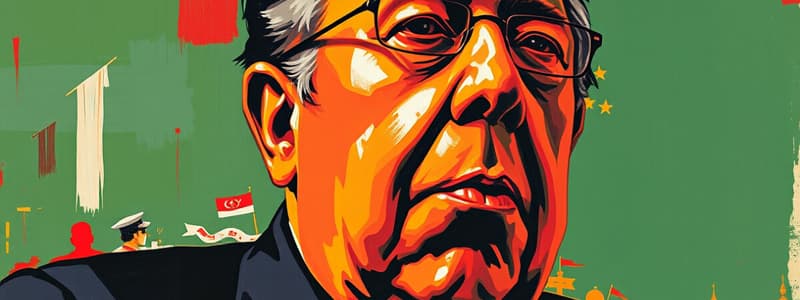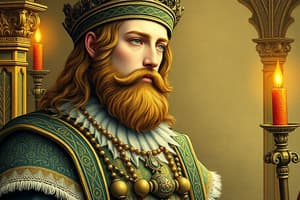Podcast
Questions and Answers
Who was Nixon's national security adviser who later became Secretary of State?
Who was Nixon's national security adviser who later became Secretary of State?
- George McGovern
- Gerald Ford
- Warren Burger
- Henry Kissinger (correct)
What policy did Nixon implement to gradually withdraw U.S. troops from Vietnam?
What policy did Nixon implement to gradually withdraw U.S. troops from Vietnam?
Vietnamization
The Nixon Doctrine stated that Asian allies would receive U.S. support without the use of U.S. ground forces.
The Nixon Doctrine stated that Asian allies would receive U.S. support without the use of U.S. ground forces.
True (A)
What tragic event occurred at Kent State in April 1970?
What tragic event occurred at Kent State in April 1970?
What massacre involved U.S. troops in a Vietnamese village in 1968?
What massacre involved U.S. troops in a Vietnamese village in 1968?
What secret history did the New York Times publish regarding Vietnam?
What secret history did the New York Times publish regarding Vietnam?
The North Vietnamese agreed to an armistice known as the ________ in 1973.
The North Vietnamese agreed to an armistice known as the ________ in 1973.
Détente refers to a time of increased tensions during the Cold War.
Détente refers to a time of increased tensions during the Cold War.
Whose visit to China in 1972 initiated diplomatic exchanges that led to U.S. recognition of the Communist government?
Whose visit to China in 1972 initiated diplomatic exchanges that led to U.S. recognition of the Communist government?
What did President Nixon impose in 1971 to combat inflation?
What did President Nixon impose in 1971 to combat inflation?
What act passed in 1972 aimed to end sex discrimination in schools?
What act passed in 1972 aimed to end sex discrimination in schools?
Match the following significant events with their outcomes:
Match the following significant events with their outcomes:
What was the term used for Nixon's strategy to appeal to southern voters?
What was the term used for Nixon's strategy to appeal to southern voters?
What major change did Jimmy Carter advocate regarding human rights?
What major change did Jimmy Carter advocate regarding human rights?
The Environmental Protection Agency (EPA) was created in 1970.
The Environmental Protection Agency (EPA) was created in 1970.
In 1978, the Senate ratified the ________ treaty to transfer control of the Panama Canal from the U.S.
In 1978, the Senate ratified the ________ treaty to transfer control of the Panama Canal from the U.S.
Flashcards are hidden until you start studying
Study Notes
Key Figures and Policies
- Henry Kissinger: Nixon's national security adviser and later secretary of state, instrumental in reducing Cold War tensions.
- Vietnamization: Nixon's strategy to gradually remove U.S. troops from Vietnam and empower South Vietnamese forces, resulting in troop reductions from over 540,000 in 1969 to under 30,000 by 1972.
- Nixon Doctrine: Established that U.S. allies in Asia would receive support without extensive deployment of U.S. ground forces.
Significant Events
- Kent State Incident: National Guard troops killed four students during protests against the Cambodian invasion in April 1970.
- My Lai Massacre: Revelation of a 1968 massacre of civilians by U.S. troops, igniting public outrage.
- Pentagon Papers: Secret documents revealing government misconduct and misleading information about the Vietnam War published by The New York Times in 1971.
Peace Agreements and Diplomatic Relations
- Paris Accords (1973): Agreement that led to U.S. withdrawal from Vietnam and promised a cease-fire and free elections, though it didn't end the war.
- Détente: Nixon and Kissinger's diplomatic strategy to ease Cold War tensions, particularly through relations with China and the Soviet Union.
- China Visit (1972): Nixon's historic meeting with Mao Zedong that initiated diplomatic relations with the People's Republic of China.
Economic Challenges
- Stagflation: The 1970s experienced stagnant economic growth and high inflation; Nixon froze wages and prices, abandoned the gold standard, and eventually resorted to deficit spending.
- New Federalism: Revenue-sharing initiative providing $30 billion in block grants to local governments to address needs independently.
- OPEC Oil Embargo: An oil embargo in 1973 by Arab OPEC nations led to widespread gas shortages in the U.S.
Legal and Social Changes
- Roe v. Wade (1973): Supreme Court decision that established a woman's right to choose an abortion, overturning many state restrictions.
- Title IX (1972): Legislation prohibiting sex discrimination in federally funded education programs.
- Bicentennial (1976): Celebrated the 200th anniversary of the United States.
Watergate Scandal
- Watergate Break-in: Nixon's reelection committee's involvement in the illegal break-in at the Democratic National Committee headquarters.
- Plumbers: A group formed by Nixon's aides to halt leaks to the press and discredit opponents.
- Impeachment and Resignation: Developments leading to Nixon's resignation in 1974 included the revelation of his involvement in a cover-up and the Supreme Court ruling against his claims of executive privilege.
Post-Nixon Presidency and Legacy
- Gerald Ford: Became president following Nixon's resignation and granted Nixon a full pardon, which was controversial.
- Fall of Saigon (1975): Marked the end of the Vietnam War with the collapse of the U.S.-backed government in Vietnam.
- Carter's Presidency: James Earl (Jimmy) Carter emphasized human rights and navigated significant diplomatic events, including the Camp David Accords and the Iranian hostage crisis.
Environmental Movements
- Earth Day: Established in 1970 to raise awareness about environmental issues.
- Environmental Legislation: Significant acts such as the Clean Air Act (1970), Clean Water Act (1972), and the Endangered Species Act (1973) aimed at protecting the environment and wildlife.
Demographic and Social Change
- Cultural Pluralism: Increasing racial and ethnic diversity in the U.S., with a rise in consciousness around distinct cultural identities.
- Hispanic Americans: Became the largest minority group by 2000, influenced by immigration patterns post-1965 reforms.
- Civil Rights Movements: Alexander movements such as the American Indian Movement aimed at self-determination and cultural revival.
Economic Policy and Reforms
- Paul Volcker's High Interest Rates: The Federal Reserve chairman raised rates to combat spiraling inflation in 1980.
- Immigration Reform and Control Act of 1986: Provided amnesty for some undocumented immigrants while penalizing employers hiring illegally.
Each point serves as a concise overview of key concepts, events, and figures relevant to the political landscape of the U.S. during the Nixon era and beyond.
Studying That Suits You
Use AI to generate personalized quizzes and flashcards to suit your learning preferences.




